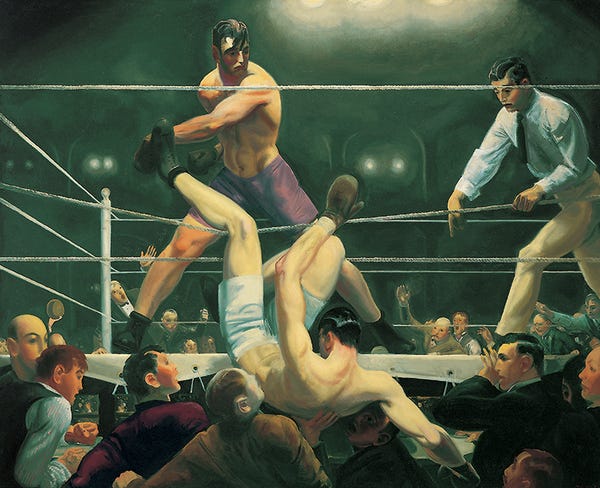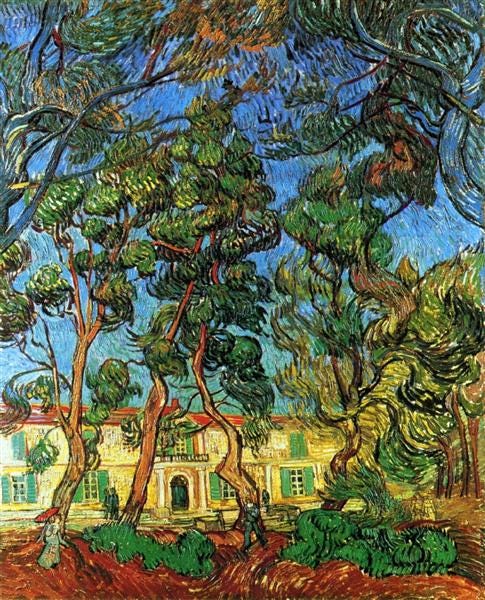Hello, my friends,
Halloween has passed and we’re now on the twisty slide to year’s end. Veteran’s Day, Thanksgiving, and the December holidays propel us forward into the openness of the future. 2024 is so close I can taste it! (In case you’re curious, it tastes like honeycomb slathered with peanut butter)
In other news, I’ve pumped the breaks a little on studying Jewish prayers. I’ve memorized Modeh Ani and Asher Yatzer (and recite them daily) but got a little stuck deciding on whether I would next work on liturgy surrounding food or going to bed. I let myself drift on the decision and have reached an island called “The Shema”. For now, I’ve been periodically peeking into the text on Sefaria but sometime soon I’ll begin to learn it in earnest. It’s a much longer undertaking than what I’ve learned so far, but that challenge also makes it appealing.
In other other news, as I continue working through drafts of the short story I mentioned writing some time ago (#28), I’m gently poking around the web for places to send it after it’s done. Earlier this week, I came upon Aethlon, “…a print journal designed to celebrate the intersection of literature with the world of play, games, and sport,” published by the Sports Literature Association (SLA). I downloaded the index of articles and through a quick search discovered that the run of the journal is available in full text through Gale’s Literature Resource Center, a database commonly available through public libraries, including mine! A few minutes later I was looking through back issues. Being able to learn about something and get my eyes on it almost instantly? Way to go, internet!
Feedback Hoop
After sending the story (it’s called “Goner,” by the way) to a few people for their opinions earlier this week, I got to thinking about the nitty-gritty of giving and receiving feedback. I’ve been writing for a couple of decades and during that time, many people have sent me work to critique. Occasionally, I gave them what they asked for only to have them become uptight! It took me longer than it should have to realize that what they really wanted was not an analytical breakdown but an “Attaboy!” (ie “Good job for doing some writing and having the courage to share!”). Once I caught onto that, I started to ask people how deep they wanted me to go.
These days, my approach to sharing my opinion is more tactful than it used to be and it doesn’t hurt that the writers I interact with tend to favor feedback over platitudes. Useful feedback is not easy to get for writers (realistically, most readers aren’t also skilled editors) so finding those who have the interpretive ability and are willing to put in the time and effort to understand the purpose, genre, and technical aspects of a piece of writing, and also have the capacity to communicate about them, are special. I’ve had a few conversations over the last few days about my story where what folks said showed me that they “got” what I was trying to do, but also tipped me off on aspects of the work that I hadn’t considered. Some suggestions I will incorporate, some I will leave behind, but all of them have been valuable.
One piece of advice I have for writers requesting feedback is keep it simple (don’t force readers jump through hoops). Some people will naturally give you a lot and that’s great, but for everyone else I share this: It was friend of the newsletter, Faith, who years ago during a screenwriting workshop at my library shared what I think is the best question to ask when requesting feedback: “What happened in the story?” A reader’s answer to that question shows you whether you’ve done the thing you set out to do.
For my story, I posed this question to my brother, Igor, and he responded: “A potent tale exhibiting destructive qualities of addiction and the male ego.”
I’d put that on the back of my book jacket!
Centuries of It
One of the inherent problems of humans is that we have trouble with long-term thinking both forward and backwards. This leads to comically poor showings at solving societal problems like homelessness, poverty, global heating, and mental health. Let’s look at the latter for a few minutes.
I don’t know if this is accurate but it seems like lots of people in the United States (maybe the world?) are suffering from social anxiety and depression. Certainly, this could have something to do with details of our present condition, but that’s an unsatisfying place to end the discussion. I posit that mental health is a generational problem that can only be solved on a large scale with multi-dimensional long-term solutions.
Psychotherapy itself already makes this clear by often delving into a patient’s childhood. But is that far enough? Would a genealogical research add anything, how about the sociological knowledge of a patient’s ancestors from two or three generations ago? Let’s get wild and talk about the future, too! Therapy tends to focus on the past, present, and near future, but how about the next generation? And the one after that? Should the therapist of a parent put some thought into the mental health of the patient’s children, or their children? Can a psychoanalytic practice be expected to maintain therapeutic continuity for 200 years or more? How would that work? Do a clinician’s priorities shift with their current patient if they are working in archival time?
In general, when thinking about societal challenges, how does continuity play into it? Would it change anything if there was a plan to end homelessness in a city whose existence didn’t depend on the whims of politicians? If there was a persistent strategy, oversight with teeth, and funding guaranteed for 30 years?
A Community That Scares Together…
I’ve never felt a particular kinship with typical Halloween fare. Costumes, scares, and trick-or-treating are all fine, even fun, but to me they’re not what’s special about Halloween. What I care about is how this secular “holiday” unifies people in common activities beyond political orientation, class, race, or gender. It’s true that some religions frown on masquerading as the undead, but most aren’t concerned with it. Indeed, Halloween is a low-stakes way for people to act neighborly, laugh, and bring delight to the youth. Even non-participation is easy — just don’t wear a costume, eschew decorations, and keep your front lights off. We argue about everything else in society, but the context of Halloween remains steady as a spirited spot in our cultural canon. I think that’s creepy cool!







